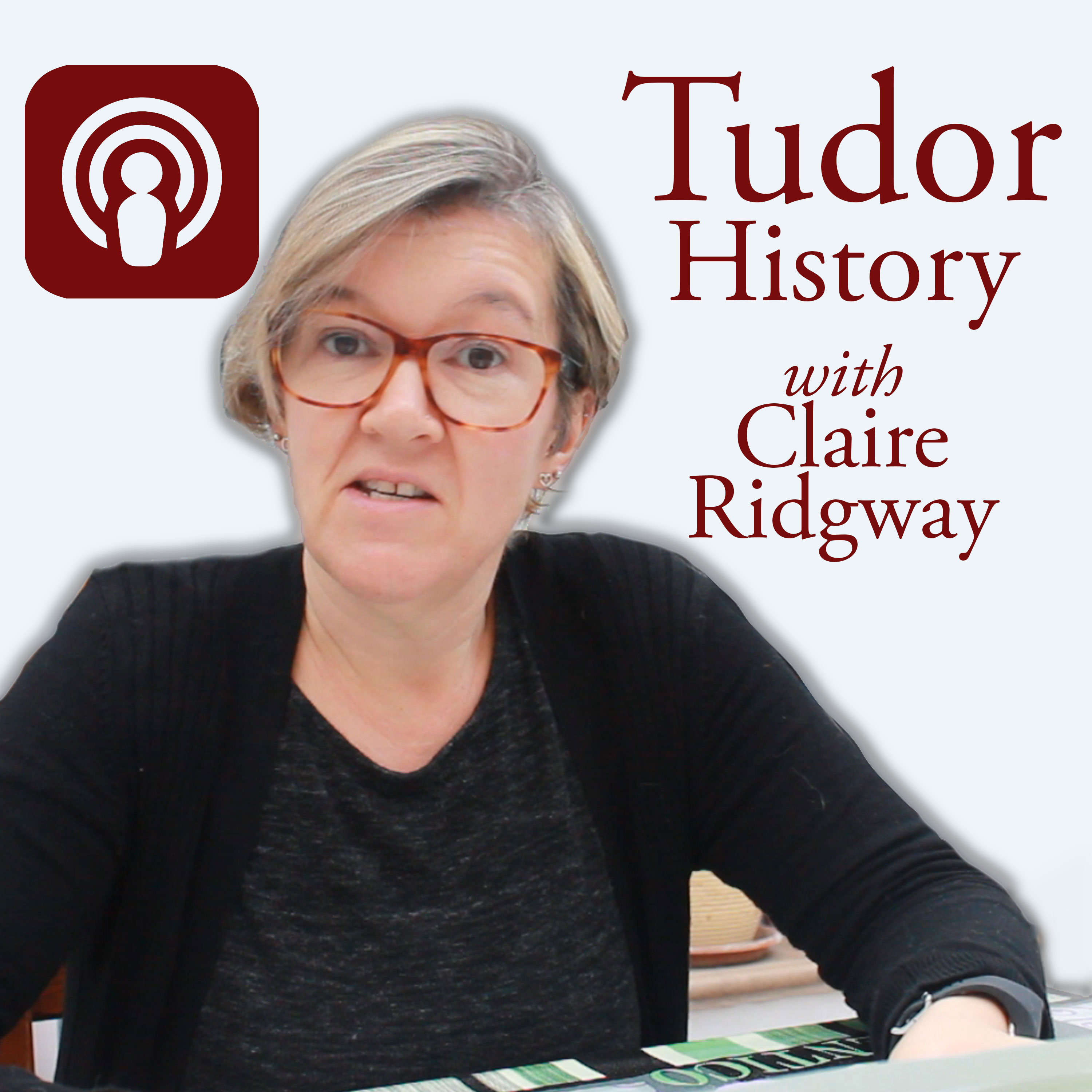Tudor History with Claire Ridgway

Step back into a world of intrigue, passion, and ruthless ambition — welcome to Tudor England. Join historian and bestselling author Claire Ridgway as she uncovers the riveting stories of the Tudor dynasty. From the scandalous love affairs of King Henry VIII to the tragic fall of Anne Boleyn, the fierce reign of Elizabeth I, and the lesser-known secrets of Tudor court life, this podcast brings history to life in vivid detail. Hear dramatic tales of betrayal, execution, forbidden love, and political manoeuvring that shaped England forever. Discover daily Tudor history with fascinating “On This Day” episodes — unique insights you won’t find in typical history books. Get behind-the-scenes stories from Claire’s own research trips to historic sites like the Tower of London, Hampton Court Palace, Hever Castle, and more. Enjoy interviews with top historians and experts in Tudor studies, plus lively Q&A sessions tackling listeners’ burning Tudor questions. 🖋 Who is Claire Ridgway? Claire is the author of the bestselling On This Day in Tudor History series and numerous other Tudor books loved by readers around the world. She founded The Tudor Society, connecting enthusiasts with experts through live online events, and runs the hugely popular history websites The Anne Boleyn Files and www.ClaireRidgway.com. Her mission: to uncover the human stories behind the crown — the hopes, fears, and triumphs of not only kings and queens but also the courtiers, rebels, and ordinary people who lived under the Tudor rose. What can you expect? - Gripping accounts of famous events like the Field of Cloth of Gold, the Dissolution of the Monasteries, or the Babington Plot. - Intimate portraits of Tudor figures: Anne Boleyn’s charm and downfall, Thomas Cromwell’s rise and brutal fall, Elizabeth I’s cunning survival. - Dark mysteries and unsolved deaths — who really killed Amy Robsart? Was Katherine Howard truly guilty? - Special episodes on Tudor fashion, food, medicine, and the day-to-day lives of Tudor men and women. Join thousands of Tudor fans worldwide Never miss an episode — subscribe now and become part of a global community that can’t get enough of Tudor drama. Explore more with Claire’s books, free resources, and live historical events at www.ClaireRidgway.com. Ready to travel back 500 years? Press play and let the adventure begin.
Step back into a world of intrigue, passion, and ruthless ambition — welcome to Tudor England. Join historian and bestselling author Claire Ridgway as she uncovers the riveting stories of the Tudor dynasty. From the scandalous love affairs of King Henry VIII to the tragic fall of Anne Boleyn, the fierce reign of Elizabeth I, and the lesser-known secrets of Tudor court life, this podcast brings history to life in vivid detail. Hear dramatic tales of betrayal, execution, forbidden love, and political manoeuvring that shaped England forever. Discover daily Tudor history with fascinating “On This Day” episodes — unique insights you won’t find in typical history books. Get behind-the-scenes stories from Claire’s own research trips to historic sites like the Tower of London, Hampton Court Palace, Hever Castle, and more. Enjoy interviews with top historians and experts in Tudor studies, plus lively Q&A sessions tackling listeners’ burning Tudor questions. 🖋 Who is Claire Ridgway? Claire is the author of the bestselling On This Day in Tudor History series and numerous other Tudor books loved by readers around the world. She founded The Tudor Society, connecting enthusiasts with experts through live online events, and runs the hugely popular history websites The Anne Boleyn Files and www.ClaireRidgway.com. Her mission: to uncover the human stories behind the crown — the hopes, fears, and triumphs of not only kings and queens but also the courtiers, rebels, and ordinary people who lived under the Tudor rose. What can you expect? - Gripping accounts of famous events like the Field of Cloth of Gold, the Dissolution of the Monasteries, or the Babington Plot. - Intimate portraits of Tudor figures: Anne Boleyn’s charm and downfall, Thomas Cromwell’s rise and brutal fall, Elizabeth I’s cunning survival. - Dark mysteries and unsolved deaths — who really killed Amy Robsart? Was Katherine Howard truly guilty? - Special episodes on Tudor fashion, food, medicine, and the day-to-day lives of Tudor men and women. Join thousands of Tudor fans worldwide Never miss an episode — subscribe now and become part of a global community that can’t get enough of Tudor drama. Explore more with Claire’s books, free resources, and live historical events at www.ClaireRidgway.com. Ready to travel back 500 years? Press play and let the adventure begin.
Episodes
Episodes



Sunday Jul 25, 2021
25 July - A kidnapped child actor
Sunday Jul 25, 2021
Sunday Jul 25, 2021
On this day in history, 25th July 1602, in the reign of King James I, thirteen-year-old Elizabethan actor Salomon Pavy was buried at the Church of St Mary Somerset, near Blackfriars Theatre.
Find out more about Salomon Pavy and how he came to be an actor in this edition of #TudorHistoryShorts from historian Claire Ridgway.
You can see this podcast as a video at the following link:https://youtu.be/t0mW8GWVy-M
Claire is the founder of the Tudor Society, an online membership site for those who love Tudor history. There, you can learn from Claire and many other expert historians and authors, enjoy Tudor-focused magazines and live Q&A sessions with experts, and have access to all kinds of talks, articles, quizzes, virtual tours and more. Try it with a 14-day free trial - https://www.tudorsociety.com/signup/
Claire has written some bestselling Tudor history books:
On This Day in Tudor History - https://amzn.to/3oceahH
The Fall of Anne Boleyn: A Countdown - https://amzn.to/3m8KaSi
George Boleyn: Tudor Poet, Courtier and Diplomat - https://amzn.to/2TdwyZr
The Anne Boleyn Collection - https://amzn.to/3kiQc1T
The Anne Boleyn Collection II - https://amzn.to/3o9LUwi
The Anne Boleyn Collection III - https://amzn.to/3kiQc1T
The Life of Anne Boleyn Colouring Books - https://amzn.to/3jkJ5Vz
Claire has also done an online history course, The Life of Anne Boleyn, for MedievalCourses.com - https://medievalcourses.com/overview/life-anne-boleyn-mc06/
You can find Claire at:
https://www.theanneboleynfiles.com
https://www.tudorsociety.com
https://www.facebook.com/theanneboleynfiles/
https://www.facebook.com/tudorsociety/
https://twitter.com/AnneBoleynFiles
https://twitter.com/thetudorsociety
https://www.instagram.com/tudor.society/
https://www.instagram.com/anneboleynfiles/



Saturday Jul 24, 2021
24 July - A converted priest loses his life
Saturday Jul 24, 2021
Saturday Jul 24, 2021
On this day in Tudor history, 24th July 1594, in the reign of Queen Elizabeth I, Catholic priest John Boste was executed in Durham.
Find out more about Boste and what led to his brutal end in this edition of #TudorHistoryShorts from historian Claire Ridgway.
You can see this podcast as a video at the following link:https://youtu.be/URKH7aj9qc0
Claire is the founder of the Tudor Society, an online membership site for those who love Tudor history. There, you can learn from Claire and many other expert historians and authors, enjoy Tudor-focused magazines and live Q&A sessions with experts, and have access to all kinds of talks, articles, quizzes, virtual tours and more. Try it with a 14-day free trial - https://www.tudorsociety.com/signup/
Claire has written some bestselling Tudor history books:
On This Day in Tudor History - https://amzn.to/3oceahH
The Fall of Anne Boleyn: A Countdown - https://amzn.to/3m8KaSi
George Boleyn: Tudor Poet, Courtier and Diplomat - https://amzn.to/2TdwyZr
The Anne Boleyn Collection - https://amzn.to/3kiQc1T
The Anne Boleyn Collection II - https://amzn.to/3o9LUwi
The Anne Boleyn Collection III - https://amzn.to/3kiQc1T
The Life of Anne Boleyn Colouring Books - https://amzn.to/3jkJ5Vz
Claire has also done an online history course, The Life of Anne Boleyn, for MedievalCourses.com - https://medievalcourses.com/overview/life-anne-boleyn-mc06/
You can find Claire at:
https://www.theanneboleynfiles.com
https://www.tudorsociety.com
https://www.facebook.com/theanneboleynfiles/
https://www.facebook.com/tudorsociety/
https://twitter.com/AnneBoleynFiles
https://twitter.com/thetudorsociety
https://www.instagram.com/tudor.society/
https://www.instagram.com/anneboleynfiles/



Friday Jul 23, 2021
23 July - John Day, a Protestant printer
Friday Jul 23, 2021
Friday Jul 23, 2021
On this day in Tudor history, 23rd July 1584, in the reign of Queen Elizabeth I, Protestant printer, bookseller and publisher John Day died.
Find out more about this Protestant printer and the famous works he printed in this edition of #TudorHistoryShorts from historian Claire Ridgway.
You can see this podcast as a video at the following link:https://youtu.be/sqnhsIx7ezY
Claire is the founder of the Tudor Society, an online membership site for those who love Tudor history. There, you can learn from Claire and many other expert historians and authors, enjoy Tudor-focused magazines and live Q&A sessions with experts, and have access to all kinds of talks, articles, quizzes, virtual tours and more. Try it with a 14-day free trial - https://www.tudorsociety.com/signup/
Claire has written some bestselling Tudor history books:
On This Day in Tudor History - https://amzn.to/3oceahH
The Fall of Anne Boleyn: A Countdown - https://amzn.to/3m8KaSi
George Boleyn: Tudor Poet, Courtier and Diplomat - https://amzn.to/2TdwyZr
The Anne Boleyn Collection - https://amzn.to/3kiQc1T
The Anne Boleyn Collection II - https://amzn.to/3o9LUwi
The Anne Boleyn Collection III - https://amzn.to/3kiQc1T
The Life of Anne Boleyn Colouring Books - https://amzn.to/3jkJ5Vz
Claire has also done an online history course, The Life of Anne Boleyn, for MedievalCourses.com - https://medievalcourses.com/overview/life-anne-boleyn-mc06/
You can find Claire at:
https://www.theanneboleynfiles.com
https://www.tudorsociety.com
https://www.facebook.com/theanneboleynfiles/
https://www.facebook.com/tudorsociety/
https://twitter.com/AnneBoleynFiles
https://twitter.com/thetudorsociety
https://www.instagram.com/tudor.society/
https://www.instagram.com/anneboleynfiles/



Thursday Jul 22, 2021
22 July - Baron Scrope, a royal councillor
Thursday Jul 22, 2021
Thursday Jul 22, 2021
On this day in history, 22nd July 1437 or 38, soldier and royal councillor John Scrope, 5th Baron Scrope of Bolton, was born.
Find out more about Scrope and his service to the Yorkists, and later imprisonment, in this edition of #TudorHistoryShorts from historian Claire Ridgway.
You can see this podcast as a video at the following link:https://youtu.be/7d0XdFlsZcQ
Claire is the founder of the Tudor Society, an online membership site for those who love Tudor history. There, you can learn from Claire and many other expert historians and authors, enjoy Tudor-focused magazines and live Q&A sessions with experts, and have access to all kinds of talks, articles, quizzes, virtual tours and more. Try it with a 14-day free trial - https://www.tudorsociety.com/signup/
Claire has written some bestselling Tudor history books:
On This Day in Tudor History - https://amzn.to/3oceahH
The Fall of Anne Boleyn: A Countdown - https://amzn.to/3m8KaSi
George Boleyn: Tudor Poet, Courtier and Diplomat - https://amzn.to/2TdwyZr
The Anne Boleyn Collection - https://amzn.to/3kiQc1T
The Anne Boleyn Collection II - https://amzn.to/3o9LUwi
The Anne Boleyn Collection III - https://amzn.to/3kiQc1T
The Life of Anne Boleyn Colouring Books - https://amzn.to/3jkJ5Vz
Claire has also done an online history course, The Life of Anne Boleyn, for MedievalCourses.com - https://medievalcourses.com/overview/life-anne-boleyn-mc06/
You can find Claire at:
https://www.theanneboleynfiles.com
https://www.tudorsociety.com
https://www.facebook.com/theanneboleynfiles/
https://www.facebook.com/tudorsociety/
https://twitter.com/AnneBoleynFiles
https://twitter.com/thetudorsociety
https://www.instagram.com/tudor.society/
https://www.instagram.com/anneboleynfiles/



Wednesday Jul 21, 2021
21 July - Explorer Thomas Cavendish
Wednesday Jul 21, 2021
Wednesday Jul 21, 2021
On this day in Tudor history, 21st July 1586, in the reign of Queen Elizabeth I, explorer Thomas Cavendish set sail from Plymouth. Where was he going and why? And how would he break Sir Francis Drake's record?
Find out more in this edition of #TudorHistoryShorts from historian Claire Ridgway.
You can see this podcast as a video at the following link:
https://youtu.be/WuP2Yk_F3Jg
Claire's video on Thomas Cavendish - https://youtu.be/Tpa3Q23T40g



Tuesday Jul 20, 2021
20 July - Philip of Spain prepares to marry Mary I
Tuesday Jul 20, 2021
Tuesday Jul 20, 2021
On this day in Tudor history, 20th July 1554, Philip of Spain, son of Holy Roman Emperor Charles V, arrived in England to prepare for his marriage to Queen Mary I.
Find out more in this edition of #TudorHistoryShorts from historian Claire Ridgway.
Here's a link to a video on their marriage - https://youtu.be/289MSTDoZHA
You can see this podcast as a video at the following link:
https://youtu.be/RmSfIR_0AB8



Monday Jul 19, 2021
19 July - Mary Boleyn dies
Monday Jul 19, 2021
Monday Jul 19, 2021
On this day in Tudor history, 19th July 1543, in the reign of King Henry VIII, Mary Boleyn died.
Mary Boleyn is known for being Henry VIII's mistress at one point, and you can find out a bit more about her in this edition of #TudorHistoryShorts from historian Claire Ridgway.
Mary Boleyn playlist - https://youtube.com/playlist?list=PLepqWJ7TpkrKSxTbgPHf6SjqFnqv_-pQ-



Sunday Jul 18, 2021
18 July - Kat Ashley, Elizabeth I's lady
Sunday Jul 18, 2021
Sunday Jul 18, 2021
On this day in Tudor history, 18th July 1565, in the reign of Queen Elizabeth I, the queen's close friend and loyal servant, Kat Ashley, died.
Find out more about Kat (also known as Katherine Ashley, Katherine Astley and Katherine Champernowne) in this edition of #TudorHistoryShorts from Claire Ridgway.
Claire is the founder of the Tudor Society, an online membership site for those who love Tudor history. There, you can learn from Claire and many other expert historians and authors, enjoy Tudor-focused magazines and live Q&A sessions with experts, and have access to all kinds of talks, articles, quizzes, virtual tours and more. Try it with a 14-day free trial - https://www.tudorsociety.com/signup/
Claire has written some bestselling Tudor history books:
On This Day in Tudor History - https://amzn.to/3oceahH
The Fall of Anne Boleyn: A Countdown - https://amzn.to/3m8KaSi
George Boleyn: Tudor Poet, Courtier and Diplomat - https://amzn.to/2TdwyZr
The Anne Boleyn Collection - https://amzn.to/3kiQc1T
The Anne Boleyn Collection II - https://amzn.to/3o9LUwi
The Anne Boleyn Collection III - https://amzn.to/3kiQc1T
The Life of Anne Boleyn Colouring Books - https://amzn.to/3jkJ5Vz
Claire has also done an online history course, The Life of Anne Boleyn, for MedievalCourses.com - https://medievalcourses.com/overview/life-anne-boleyn-mc06/
You can find Claire at:
https://www.theanneboleynfiles.com
https://www.tudorsociety.com
https://www.facebook.com/theanneboleynfiles/
https://www.facebook.com/tudorsociety/
https://twitter.com/AnneBoleynFiles
https://twitter.com/thetudorsociety
https://www.instagram.com/tudor.society/
https://www.instagram.com/anneboleynfiles/

I'm historian Claire Ridgway
I'm the best-selling author of 13 history books and the founder of the TheAnneBoleynFiles.com, Elizabethfiles.com and The Tudor Society.
I help Tudor history lovers worldwide to gain access to experts and resources to discover the real stories behind myths and fiction, so that they grow in knowledge while connecting with like-minded people and indulging their passion for history.
I am a Fellow of the Royal Historical Society. I was a contributor for the BBC docudrama The Boleyns: A Scandalous Family, and have been featured in BBC History Extra, USA Today, History of Royals Magazine, the Express, and Refinery 29, as well as on podcasts including Suzannah Lipscomb's Not Just the Tudors, Gareth Russell's Single Malt History, Natalie Grueninger's Talking Tudors, Hever Castle's Inside Hever, James Boulton's Queens of England, and many more.









